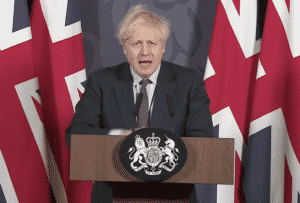Boris Johnson once again told people to work from home yesterday as he tightened Covid-19 restrictions after being warned that a million people would catch the Omicron variant in the next month.
Covid passports will be required for big events and masks made compulsory in all indoor public places in England, apart from hospitality, after government scientists concluded that Omicron would outpace the Delta strain within the next four weeks.
Johnson said that Omicron was growing “much faster” than Delta and that with hospital admissions in South Africa doubling in a week “we can’t yet assume that Omicron is less severe than previous variants”. He said Britain must be “humble in the face of this virus”.
The prime minister sought to play down the impact of the restrictions, saying that “irritating though it may be, it is not a lockdown”, and held out the prospect of easing the measures over the next month if emerging data is reassuring. “The best way to ensure we all have a Christmas as close to normal as possible is to get on with plan B,” he argued.
However, Rishi Sunak questioned whether there was an exit strategy from the new rules at a tense ministerial meeting yesterday, and resisted further support packages for businesses. Michael Gove, the levelling up secretary, is understood to have raised concerns that the measures may not go far enough and that further restrictions may soon be needed.
Ministers accept that the measures announced last night will not stop Omicron spreading but hope to delay the peak until later next month, when more people will have had boosters. Government scientific advisers privately fear that “plan C or D” may be needed after Christmas if infections are not slowed enough to prevent the NHS from being overwhelmed. The plan stops short of harsher lockdown restrictions such as the return of isolation for those who come into contact with Covid-19 cases, or the extension of vaccine passports to pubs and restaurants.
Professor Chris Whitty, chief medical officer for England, said that Omicron infections in Britain were “going up incredibly fast” and a serious increase in hospital admissions was “probably the way to bet”. He said that infections were “doubling between every two and three days. That is an extraordinarily fast rate and you therefore get from very small numbers to very large numbers really quite quickly.”
Johnson faced a furious backlash from Conservative MPs, with William Wragg, chairman of the public administration committee, accusing him of imposing restrictions as a tactic to divert attention from a furore over last year’s Downing Street Christmas party.
Mark Harper, head of the lockdown-sceptic Covid Recovery Group, said that the government’s credibility had been “seriously damaged”, adding that vaccine passports were “pointless and damaging” and that working from home “will batter sectors of the economy that are just getting back on their feet”.
Johnson denied that the announcement was designed to “coincide with events in politics”, asking how people would react if he had delayed for political reasons. “You’ve got to act to protect public health when you’ve got the clear evidence,” he said. The prime minister argued that the measures were “proportionate and responsible”.
Sajid Javid, the health secretary, said that although only 586 Omicron cases had been confirmed in Britain, the true number was probably closer to 10,000. He warned that at the present rate “by the end of this month infections could exceed a million”. At present infection rates a similar number would be expected to catch Delta in that time.
After its meeting on Tuesday, the Scientific Advisory Group for Emergencies (Sage) said preliminary modelling suggested that, without changes, the number of hospital admissions for Covid-19 could be higher than 1,000 to 2,000 a day.
Johnson told a Downing Street press conference, where he was joined by Whitty and Sir Patrick Vallance, the chief scientific adviser: “You’ve got to act to protect public health when you’ve got the clear evidence. I think I’m right in saying that Sage only met yesterday to discuss this, the evidence of the transmissibility of the virus — we’ve been watching it for days but it has become, I’m afraid, unmissable, not just in South Africa [where the variant was first identified] but in this country.”
















